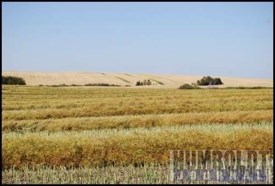The government of Saskatchewan has scored a victory in its ongoing trade dispute with Quebec that could benefit oilseed producers and processors in the province.
On April 30, a dispute resolution panel established under the Agreement on Internal Trade (AIT) found that Quebec's restrictions on the production, sale and marketing of products like margarines and dessert toppings, many of which are vegetable oil-based, violate Canada's internal trade rules. The oil used in many of those products derives from Saskatchewan staples like canola and flaxseed.
The Quebec government is appealing the ruling, a process that could take up to seven months. The three-person panel ordered Quebec to adjust its regulations by the end of 2014.
The Saskatchewan government, which was supported by governments in B.C., Alberta and Manitoba, believed that Quebec was restricting trade in those products to protect its own dairy industry.
"We will vigorously advance Saskatchewan's position in the appeal process," Agriculture Minister Lyle Stewart said in a statement. "We're confident the original ruling will prevail and that Quebec will adjust its rules as quickly as possible, allowing full access to its market for our producers."
The Agricultural Producers Association of Saskatchewan (APAS), an advocacy group dedicated to promoting farm issues in the province, was happy with the outcome.
"We hadn't followed it too closely until the verdict came out," said Norm Hall, president of APAS. "We are encouraged by the result and that we will hopefully have another market open up for our canola producers."
A variety of rapeseed developed by crossbreeding experiments during the 1960s and 70s, canola has come to dominate the oilseed market in Canada, and especially in Saskatchewan. In 2013, Saskatchewan produced nearly nine million tonnes of canola, representing approximately half of all production in Canada. Over 10 million acres of land in Saskatchewan is dedicated to canola production, something that's easy to see when the crop blankets so many fields in shades of yellow.
Since the Census of Agriculture began tracking canola in 1956, the area devoted to canola production has expanded exponentially and it has become, in many areas, the mot important crop grown each year.
According to Hall, it can often be more difficult to export that bountiful and important crop within Canada than to other parts of the world.
"What we've found in trading is that it's so much easier to trade north and south than it is east to west," Hall said. "Even going over the oceans is easier than doing it east and west."
Even though this dispute pitted two provinces against one other, some national organizations publicly came out in support of the decision, among them the Vegetable Oil Industry of Canada.
"Today's ruling is a positive development, one we expect to be upheld on appeal," the organization's president, Sean McPhee, said in a statement. "We acknowledge the leadership shown by Saskatchewan, along with other western provinces, in pursuing open markets in Canada. It seems like a small thing, but businesses in Canada should not be discriminated against by unfair trade rules."
The final resolution of the dispute depends on the outcome of Quebec's appeal, a development that will surely be watched with great interest across western Canada, and especially here in Saskatchewan.




